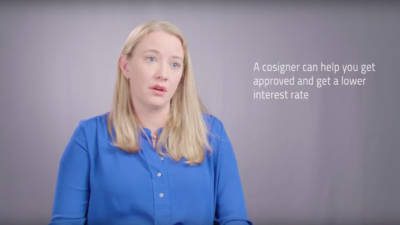Now that you’ve enrolled in college and know where you’ll be in the fall, you’re probably focused on how you’re going to pay for it.
If you’ve tallied up your savings, scholarships, grants, and federal student loans and still have costs to cover, you might want to consider private student loans. Below, we answer the top questions on how private student loans work with the complete guide to private student loans.
Private Student Loan Lenders
With federal student loans, the lender is always the government. That’s not the case with private student loans. Private student loan lenders can be a bank, a credit union, or another financial institution. This means there’s a variety of lenders to choose from, all of which may offer different rates, terms, and benefits. Take the time to research the lenders you’re considering, and see if you can find online reviews from current or recent students about their experiences.
Cosigners and Parent Loans
As a student, you may not have an established credit history yet. That’s why it may be beneficial—or even required—to have a cosigner on your private student loan. A cosigner is someone who agrees to take equal responsibility for the loan. That means that if you don’t make your loan payments on time, it’s up to your cosigner to cover your debt. Your cosigner should be an adult you know well but doesn’t necessarily have to be your parent, and they should have good-to-excellent credit. Some lenders offer loans specifically for parents or other adults to take out on behalf of the student to pay for their education.
Private Student Loans Interest and Fees
Interest is what the lender charges you to borrow money. With private student loans, there are two kinds of interest rates—fixed and variable. With a fixed rate loan, your rate stays the same for the life of the loan, so you know exactly how much your payment will be each month. A variable rate loan tends to have a lower starting rate, but since rates are tied to an index, your rate can increase or decrease over the life of the loan based on whether the rate index is increasing or decreasing. Similarly, your monthly payment can increase or decrease if the index increases or decreases.
Comparing rate options is a great way to find one that works best for you; using student loan calculators can help you assess a few what-if scenarios.
Some private student loans may also come with fees. Be sure you are aware of the fees you could be charged—such as application fees and late-payment fees—since these can add to your cost.
Private Student Loans Repayment
It’s also helpful to understand the repayment terms of each private student loan you’re considering. Many private student loans have the option of deferring payments until after graduation if you are enrolled at least half-time. This can be an appealing option as students often don’t have a steady stream of income. Interest continues to accrue during deferment, so waiting to make loan payments until after you graduate will result in paying more in interest. If you opt for in-school deferment, making lump-sum payments or even small payments each month while you’re in school can help you save money over the life of your loan.
There are also repayment options that require small monthly payments (sometimes as little as $25 a month) or interest-only payments while you’re in school. These repayment plans can help save money on the cost of the loan and can sometimes have a lower interest rate.
Private Student Loans Grace Period
Your grace period can also affect how much you pay back. A grace period is a designated period of time after you graduate, leave school, or drop below half-time enrollment status before you must begin making full payments of principal and interest. If you have in-school deferment, then you will not be required to make payments during this time. If you’ve opted to make required in-school payments, these will continue during your grace period. Once your grace period ends, your unpaid accrued interest will be added to your principal loan balance. The duration of the grace period is often six months, but check with the lender to understand the exact timing and terms of the grace period for the private student loans you’re considering.
Private Student Loans Benefits
Keep an eye out for interest-rate reductions and benefits associated with the private student loans you’re considering. Many private student loan lenders offer an interest-rate reduction for making automatic payments, which can help save you money over the life of your loan.
Look out for additional loan benefits like cash rewards for good grades and make sure to read the fine print to see if you will qualify.
Determining what private student loan to choose is an important decision. This information—along with your own research comparing private student loans and conversations with lenders—can help you and your family make the best decision for your financial needs.






